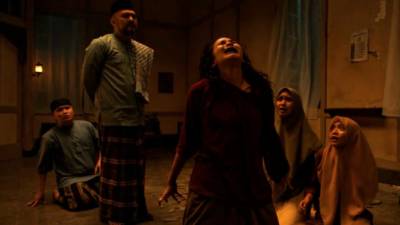KITAB Sijjin & Illiyyin is an emotional demolition derby where grief, revenge and black magic slam into each other until no one walks away clean. Directed by Hadrah Daeng Ratu, this Indonesian chiller stitches together folklore, family melodrama and ritualistic terror with a story that is tragic at its core.
At its surface, it is the tale of Yuli, a woman pushed past breaking point after decades of humiliation and betrayal. Her solution? Summon a black magic ritual that could make even seasoned horror fans say, “Maybe therapy was cheaper.”
But the film does not let audiences rest comfortably on her side. While Yuli is undeniably wronged, her path of vengeance spirals into decisions so desperate and dark that rooting for her feels like cheering for a tornado – it is destructive, but you understand how it formed.
Villains all the way down
The twisted beauty of Kitab Sijjin & Illiyyin is that it offers no clean hero to rally behind. Instead, it presents a moral chessboard where every player is a shade of villain. Yuli, though sympathetic, chooses black magic as her weapon of justice. Her so-called family, meanwhile, are a walking lesson in cruelty, selfishness and generational trauma.
The irony? The grandmother, the supposed matriarch of wisdom and order, is revealed to be the root of the family’s rot.
By the time the credits roll, the audience is left with the uncomfortable realisation: this is not about good versus evil.
It is about bad versus worse and the winner is… well, whoever manages to survive the curse the longest. Watching the film with the mindset of “you will either root for the villain or the other villain” is the only way to get through it without crying into the popcorn.
Horrific story
There is no delicate way to phrase it – the narrative is just plain messed up. Betrayal, cruelty, black magic rituals involving freshly dead bodies and family ties used as chains rather than bonds – all these ingredients make for a story that feels more like a nightmare than a drama.
Yet that is also what makes it so effective. The film leans hard into its melodrama, painting Yuli’s tragic backstory in broad, emotional strokes. It is the kind of storytelling that makes the audience mutter “Oh no” every ten minutes – not because the scares are cheap, but because the human decisions are horrifying enough on their own.
When characters suffer, it is not just the supernatural at play – it is the weight of years of cruelty finally crushing them.
Performances that sell madness
The cast elevates what could have been a one-note revenge tale into a genuinely gripping tragedy. Yunita Siregar delivers a layered portrayal of Yuli, moving smoothly between victim, avenger and tormented soul. Dinda Kanyadewi’s Laras is sharp, fiery and infuriatingly believable as the daughter who thrives on cruelty.
The supporting roles add texture: Tarra Budiman as the indifferent husband Rudi, Kawai Labiba as the well-meaning but powerless Tika and Sultan Hamonangan as Dean, the mischievous grandson who represents innocence and inherited malice.
Together, they make the “family from hell” feel uncomfortably real and that realism is what makes the horror cut deeper.
Rituals, corpses, consequences
Of course, this being a horror film, the supernatural elements are just as important as the family drama. The black magic ritual at the heart of the film is one of the most unsettling premises in recent horror, requiring the names of victims to be inserted into a fresh corpse within a strict seven-day timeline. Fail and the caster pays the price.
This ticking-clock device injects urgency into the story, keeping the suspense taut. The film does not shy away from the grotesque either, corpse rituals are presented with just enough detail to make audiences squirm without tipping into gratuitous gore.
The result is horror rooted in ritualistic dread rather than jump scares, creating a suffocating atmosphere that lingers long after the lights go up.
Sympathy, condemnation in equal measure
What sets Kitab Sijjin & Illiyyin apart is its refusal to let anyone off the hook. The audience is forced into a contradictory position, feeling sorry for Yuli while simultaneously condemning her actions. The film practically dares viewers to ask themselves: “What would you do after decades of abuse?”
The answer, thankfully, is not “black magic corpse rituals”, but the film’s effectiveness lies in making that path feel, however briefly, understandable.
This tension between sympathy and condemnation drives the emotional weight of the story. It is tragic not only because of what happens but because every character had choices and nearly all of them chose cruelty, silence or revenge.
Should you watch it?
Absolutely, but with the right mindset. Go in expecting a neat moral divide between hero and villain and disappointment awaits. Approach it knowing that every character is flawed, damaged or downright monstrous, and the film reveals itself as a chilling study of how generational trauma festers. It is horror not just because of curses and corpses, but because families can destroy each other in ways more terrifying than ghosts.
At 99 minutes, the pacing is sharp, ensuring the melodrama does not overstay its welcome. The film manages to juggle atmosphere, performances and ritualistic dread without slipping into campy territory. It is messy, yes, but it is the kind of deliberate mess that sticks in the memory.
Tragedy with no innocents
Kitab Sijjin & Illiyyin is a tragic story altogether. The grandma may have been the true architect of the family’s suffering, but everyone else ends up wronged in the fallout of her death and decisions.
Yuli’s descent into black magic is as horrifying as the abuse that led her there, creating a story where right and wrong collapse into one tragic blur.
It is a film where rooting for the protagonist feels dangerous, condemning her feels unfair and the only real winner is the audience – if they manage to stomach the ride.
